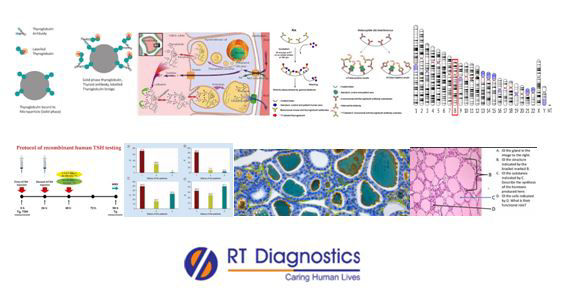Thyroglobulin:
Why Thyroglobulin Test?
CLINICAL INFORMATION
The thyroid gland is a small butterfly-shaped endocrine gland present in the front of the neck (below the voice-box). The thyroid gland secretes thyroid hormones into the blood which helps to reach target tissues. Thyroid hormones (T3 and T4) play a key role in many body functions like BMR, digestion, fertility, growth, heart rate etc. The thyroid gland helps regulate metabolism through the synthesis of thyroid hormones. It regulates metabolism through the production of thyroid hormones T3 and T4. The most common types of thyroid cancers are papillary and follicular thyroid cancers. Tests for thyroid cancers involve examination of the neck, radioactive scanning, measurement of thyroglobulin (ELISA), thyroid antibodies (Hashimoto’s thyroiditis – autoimmune hypothyroidism or Grave’s disease – Hyperthyroidism), thyroglobulin antibodies (TgAb) etc. Clinical manifestations of an under-active thyroid include – digestive problems including constipation, problems in menstruation (in women), tiredness and lack of energy, dry hair and skin, swelling around the eyes, and frequent feeling of being cold, weight gain, depression, forgetfulness, joint pains etc. Signs and symptoms of an overactive thyroid include – feeling weak and tired, trembling of hands and fingers, weight loss, anxiety, nervousness, irritability, sweating heavy, fast and irregular heartbeat, low tolerance for heat etc. Thyroglobulin is a glycoprotein synthesized by follicular cells of the thyroid gland. Thyroglobulin acts as a substrate for the synthesis of thyroid hormones T3 – triiodothyronine and T4 – thyroxine. Thus the newly synthesized thyroid hormones T3 and T4are attached to thyroglobulin, which are present in colloid form within the follicle. When TSH is stimulated it triggers the release of active thyroid hormones (T3 and T4) that circulate in the blood. Moreover, thyroglobulin helps in the storage of the inactive forms of thyroid hormones along with iodine in the thyroid gland. Thyroglobulin can also be secreted by certain types of cancer. Thus any abnormality that can increase the size of the thyroid (nodule, cancer, auto-immune diseases etc) can also concurrently also raise the levels of thyroglobulin levels. Hence thyroglobulin test is used to screen for detecting its associated pathologies. Thyroglobulin test in the blood is especially important in post-surgical thyroidectomy in cancerous cases (since the removal of the thyroid gland -lobectomy), since in such rare cases with thyroid cancer surgeries (if remnant cells remain undetected – i.e in case of metastasis, it will keep elevating thyroid levels in spite of thyroidectomy) might survive and this test helps to track them down (recurrence). The thyroglobulin test also aids in the prognosis (efficacy of the treatment). High thyroglobulin levels can be due to certain abnormalities such as thyroid cancers, benign thyroid tumours, thyroid nodules, under-active thyroid, Grave’s disease, excess or deficiency of iodine, and liver cirrhosis, acromegaly, medications like carbimazole, methimazole etc. Causes for low thyroglobulin levels include excess exogenous synthetic T4 hormones, thyroidectomy, medications such as levothyroxine, exogenous synthetic TSH, somatostatin, aspirin, prednisolone etc. Other associated pathologies with increased thyroglobulin antibodies include rheumatoid arthritis, type-1 diabetes mellitus, Celiac disease etc. Factors that can interfere with the thyroglobulin test include thyroglobulin antibodies, biotin, estrogen (in females) etc. Additional tests include anti-thyroid antibodies test (eg. TgAb) etc. Other tests include ultrasound of the neck and imaging studies etc.

General Instructions:
Sample Requirement: Specimen - Blood sample collected from the vein (biotin –vitamin B7 medication must be stopped 12 hours before this test). Test Preparation: None.
NOTE - Sample for specimen collections may vary based on the patient’s condition/cases according to the patient’s presenting complaints/signs or symptoms:
SPECIMEN REQUIREMENT (Special or Rare Cases) - As instructed and guided by Physician / Clinician / Pathologist / as per Laboratory’s requirements, according to procedures and protocols.
This Multi-Specialty Clinical Referral Laboratory RT DIAGNOSTICS provides precise and accurate tests with an extensive range of testing services to the medical centres to help in the diagnosis and identification of pathology in the test specimens for infectious diseases and also to evaluate the function of organ systems of the patient. It prevents further complications and helps to stabilize and restore health to near normalcy at the earliest without delay.



